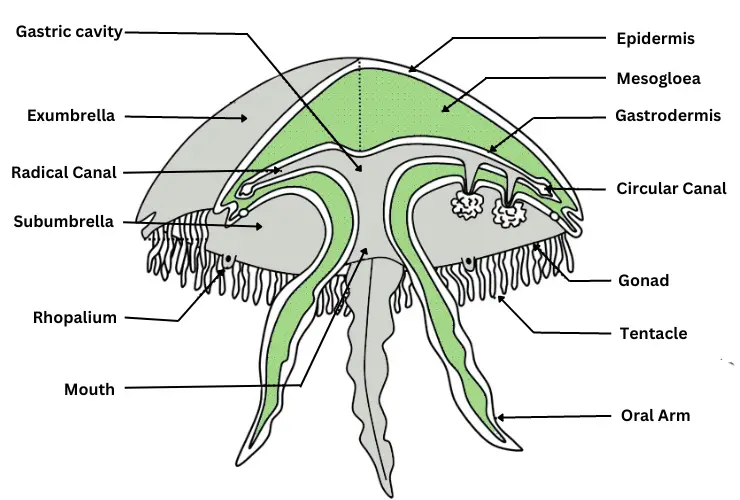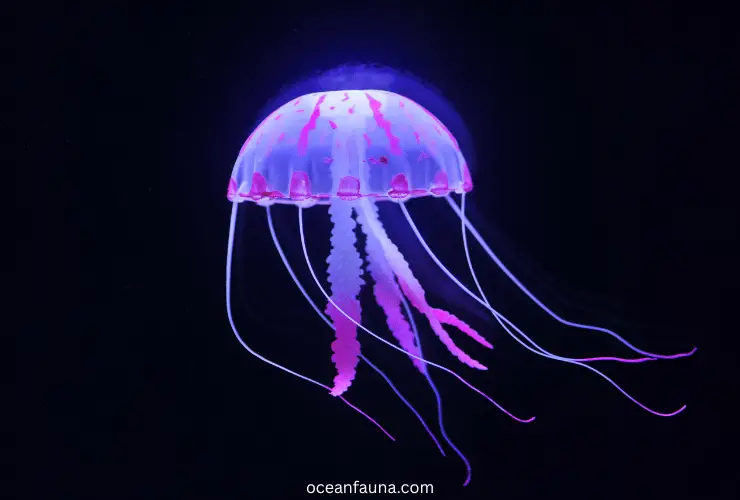Jellyfish do not have a brain. They are fascinating invertebrates that have been thriving in the ocean for over 500 million years without a centralized nervous system.
Instead, they have evolved a complex nervous system spread throughout their body. This nerve net comprises specialized cells called neurons that help them sense and respond to their environment.
But how do these creatures survive and navigate their environment without a centralized brain? In this blog, we’ll explore the answer to this intriguing question and discover the incredible adaptations that allow them to thrive in the ocean without a brain.
Do Jellyfish Have a Brain?
Jellyfish do not have a central, singular brain. But they do have a simple nervous system consisting of a network of nerves. The CNS network spreads radially throughout the body.

These nerves act as sensory organs that detect touch, temperature, and saltiness. The jellyfish respond reflexively to these stimuli. This nervous system is relatively simple but adapted to the jellyfish’s unique body plan.
Despite not having a brain, jellyfish can still do amazing things, like finding food and moving around in the ocean.
Some species of jellyfish, such as the box jellyfish, have eyes that allow them to detect light and form crude images. However, they do not have the visual sharpness of animals with a centralized brain.
How Do Jellyfish Live without a Brain?
Jellyfish live using their nerve net. Their nerve net comprises specialized cells called neurons distributed throughout their body.
It helps them control their muscle movements, allowing them to swim and respond to their environment. The nerve net also helps them recognize their environment and detect prey, which they capture using their stinging tentacles.
Jellyfish also have other adaptations that allow them to thrive. For example, they have a unique ability to regenerate damaged body parts, including the nerve net. This remarkable ability allows the jellyfish to recover from injuries and continue daily activities.
How Do Jellyfish Move without a Brain?
Jellyfish have muscle cells that contract to propel themselves through the water. These contractions are coordinated by a nerve net, which allows the jellyfish to control the timing and strength of their movements.
In addition to muscle contractions, jellyfish also use the flow of water around their bodies to move. They have bell-shaped bodies with tentacles that extend outward, and they use the movement of water through their bodies to push themselves forward.
Jellyfish Nervous Systems: 2 Interconnected Nerve Nets
Although their nervous system is relatively simple, it is not just limited to a diffuse nerve net.
Instead, they have 2 interconnected nerve nets – a) the diffuse nerve net and b) the motor nerve net.
- The diffuse nerve net is responsible for sensing and responding to external stimuli.
- On the other hand, the motor nerve net coordinates their movement.
Jellyfish use their nerve net to discern light from the dark and orient themselves in their surroundings. Interestingly, some jellyfish species, like the box jellyfish, can actively hunt and kill their prey despite having no brain.
Researchers have recently discovered that jellyfish exhibit sleep-like behaviors. It suggests that even animals without a central nervous system need to rest and rejuvenate.
How do the Jellyfish Heck Work if They Have No Brain?
Jellyfish may seem mysterious. While they don’t have dedicated structures, they have several adaptations that allow them to move and respond to their environment.

For instance, jellyfish have finger-like sensory projections called rhopalia, which function similarly to the cerebellum in human brains. These structures allow jellyfish to respond to stimuli like light or touch.
Do Jellyfish Have Memories?
The nerve net of jellyfish does not have the capacity for complex cognition or long-term memory storage.
While they can respond to their environment and make simple behavioral adjustments, they do not have the cognitive capacity for true learning and memory formation.
Therefore, jellyfish are not believed to possess memories like those found in humans or other animals.
FAQs
How many brain cells do jellyfish have?
Jellyfish do not have a fixed number of brain cells because they do not have a central nervous system.
Are jellyfish aware they are alive?
Jellyfish don’t have a brain, so they don’t know they are alive. They are not “conscious” and can’t think or feel in the way that we do.
Can a jellyfish think?
Jellyfish do not possess advanced cognitive abilities like thinking, learning, or problem-solving. They can respond to stimuli in their environment through reflexes and basic behaviors.
Which animal has a nervous system but no brain like jellyfish?
In addition to jellyfish, there are other animals with a nervous system but no brain, like jellyfish. Some examples include sea anemones, flatworms, hydra, and comb jellies.
Conclusion
Jellyfish are amazing creatures that can do many things, even without a brain! They can search for food, escape from animals that want to eat them, have babies, and hang out with other jellyfish. Even though they have a simple body, they can do many different things.
But that’s not all! Did you know that jellyfish can rapidly contract their bodies, allowing them to swim up to 4 miles per hour? Even though jellyfish may not be the smartest, they are definitely one of the most interesting sea creatures. They’ve been around for a very long time and have survived many big events in the history of the Earth.


6 thoughts on “Do Jellyfish Have a Brain?”